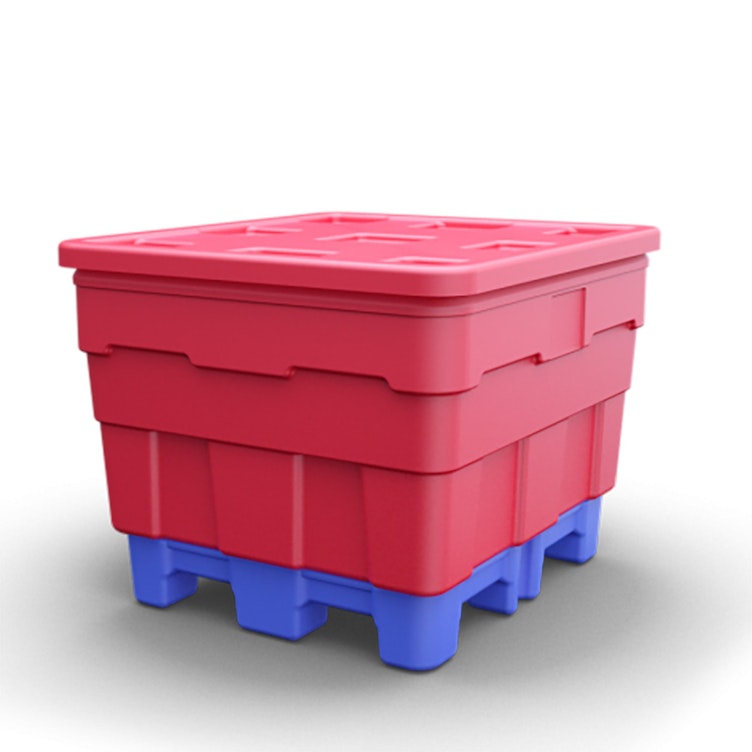Learn why Bulk Plastic Containers are perfect for modern warehousing needs
The Duty of Bulk Plastic Containers in Effective Recycling Practices and Sustainability
Mass plastic containers are important to contemporary reusing efforts. Their style enhances the efficiency of product collection and transport, adding to sustainability goals. These containers not just maximize space however additionally assist in keeping track of contamination degrees. Nonetheless, their execution is not without challenges. Recognizing the full extent of their effect discloses an intricate connection in between logistics and environmental obligation that warrants additional exploration.
Understanding Mass Plastic Containers
Mass plastic containers act as a vital element in numerous industries, facilitating the storage space and transportation of goods. These containers are generally made from robust materials such as high-density polyethylene (HDPE) or polypropylene, which give toughness and resistance to environmental factors. Their layout often consists of features like stackability and modularity, permitting effective use space during both storage and transit.
Industries such as farming, food handling, and producing often use mass plastic containers because of their light-weight nature and convenience of handling. The containers can be found in different dimensions and configurations, catering to the certain requirements of various items. Their flexibility prolongs past mere performance; they can likewise be personalized with lids, takes care of, and classifying alternatives to boost usability - Bulk Plastic Containers. Therefore, bulk plastic containers play a critical duty in maximizing logistics and supply chain operations across several industries, thereby adding to general effectiveness and cost-effectiveness
Benefits of Using Bulk Plastic Containers in Recycling
The utilization of bulk plastic containers significantly improves the efficiency of the process when organizations focus on reusing initiatives. These containers are created to maximize area, permitting the storage space and transport of bigger amounts of recyclable materials. This causes fewer trips to recycling facilities, therefore reducing gas intake and associated discharges.
Additionally, bulk plastic containers are durable and resistant to numerous ecological aspects, ensuring that materials continue to be protected during handling and transportation. Their light-weight layout additionally adds to lower transportation costs.
Furthermore, the uniformity of these containers facilitates far better sorting and processing of recyclable products, which can boost total recycling rates - Bulk Plastic Containers. Organizations that take on bulk plastic containers likewise show a dedication to sustainability, positively affecting their brand picture. Ultimately, these advantages not only streamline reusing techniques however additionally contribute to broader environmental objectives
How Mass Plastic Containers Facilitate Material Collection
Effective material collection is greatly boosted by the use of bulk plastic containers, as they offer a effective and organized solution for gathering recyclable things. These containers are developed to accommodate large quantities of materials, which streamlines the sorting and storage space procedure. Their stackable layout makes the most of area application, making it easier for facilities to arrange recyclables without clutter.
Furthermore, bulk plastic containers are long lasting and weather-resistant, enabling exterior positioning without degradation. This durability guarantees that materials remain safeguarded till they are accumulated for handling.

The harmony in shapes and size of these containers helps with standardization throughout collection points, making it possible for better monitoring of recyclable quantities. Additionally, their transparent nature permits very easy exposure of contents, helping in the tracking of contamination levels and guaranteeing that only appropriate materials are gathered. Overall, bulk plastic containers play a vital role in simplifying the product collection process, thereby advertising efficient recycling methods.
Transportation Performance and Environmental Influence
Transport effectiveness plays a crucial function in the reusing procedure, particularly through the optimization of lots ability wholesale plastic containers. By taking full advantage of the volume of product delivered, firms can substantially minimize the variety of journeys required, thereby lessening their carbon footprint. This technique not only boosts operational performance however also contributes to much more sustainable environmental practices.

Optimizing Load Ability
Although maximizing lots capability is frequently neglected, it plays a vital role in improving transportation effectiveness and decreasing ecological impact in recycling practices. By taking full advantage of the quantity that mass plastic containers can hold, reusing operations can lower the variety of journeys needed for transportation. This not only decreases gas consumption yet additionally lowers the wear and tear on cars. Effective tons management allows facilities to utilize space properly, ensuring that each transport cycle is as productive as possible. In addition, well-optimized lots can result in much better arrangements with logistics carriers, possibly lowering overall costs. Ultimately, enhancing tons capacity adds to a much more lasting reusing system by promoting effective resource use and decreasing waste created throughout transport.
Decreasing Carbon Impact
As recycling operations undertaking to lessen their environmental effect, decreasing the carbon impact click here for more info linked with transport arises as an essential objective. Bulk plastic containers play a critical role in achieving this purpose by enhancing tons efficiency and enhancing logistics. Their light-weight yet sturdy style allows for maximum cargo space application, reducing the number of journeys called for to transfer products. By consolidating shipments, recycling facilities can reduce fuel usage and greenhouse gas exhausts. In enhancement, strategically locating recycling facilities lessens transport ranges, furthermore reducing carbon outcomes. In addition, utilizing fuel-efficient lorries and alternate power sources enhances general sustainability. By integrating these practices, the recycling industry can appreciably lessen its carbon footprint, adding to an extra sustainable future.
Obstacles in making use of Mass Plastic Containers

Contamination Concerns
Contamination issues stand for a substantial difficulty in the reliable usage of bulk plastic containers within reusing methods. These containers usually gather deposits from previous components, bring about blended materials that can impede the reusing process. Pollutants such as food waste, chemicals, or non-recyclable products can compromise the integrity of the whole set, leading to enhanced disposal prices and reduced recycling prices. Furthermore, incorrect cleaning or sorting can exacerbate these problems, making it hard for reusing facilities to process products successfully. The existence of pollutants not just impacts the top quality of recycled products however likewise threatens the total sustainability efforts targeted at minimizing plastic waste. Attending to these contamination obstacles is critical for boosting the efficacy of bulk plastic container recycling.
Recycling Framework Limitations
Inadequacy in reusing infrastructure postures significant challenges for the efficient administration of bulk plastic containers. Lots of reusing facilities do not have the ability to process large quantities of these containers effectively, causing enhanced prices and delays. Moreover, insufficient sorting innovations usually bring about contamination, as mass containers may be blended with various other products, complicating the recycling procedure. Restricted transport alternatives additionally prevent the movement of mass plastic containers to ideal reusing centers, bring about boosted landfill waste. In addition, a lack of standard methods for mass container recycling produces complication amongst services and customers, even more making complex efforts to promote sustainability. Addressing these infrastructure restrictions is vital to improve reusing practices and make the most of the capacity of mass plastic containers in a round economy.
Ideal Practices for Carrying Out Bulk Plastic Containers
They must focus on a strategic technique that enhances performance and minimizes contamination risks when companies take into consideration executing mass plastic containers in their reusing techniques. Selecting the appropriate container dimension and type is vital to accommodate the quantity of materials being processed. Organizations ought to likewise develop clear labeling and signs to guide customers on correct disposal techniques, lessening confusion and mistakes. Routine training sessions for staff can even more enhance these practices, making certain every person comprehends their roles in maintaining recycling integrity.
In addition, companies need to carry out a routine upkeep routine to check and tidy containers, avoiding the accumulation of pollutants. Partnering with neighborhood reusing facilities can likewise improve the collection process, ensuring that products are successfully processed. Companies must check and evaluate their reusing metrics, utilizing this information to fine-tune methods over time and advertise continuous improvement in their sustainability initiatives.
The Future of Mass Plastic Containers in Lasting Practices
As companies significantly focus on sustainability, the duty of bulk plastic containers in reusing methods is established to progress significantly. Developments in materials science are bring about the growth of biodegradable and recyclable choices, enhancing the environmental benefits of mass plastic containers. In addition, the implementation of closed-loop systems will certainly allow for easier collection and repurposing of these containers, minimizing waste and source usage.
Technological advancements, such as smart monitoring systems, will certainly enable firms to keep track of the lifecycle of mass containers, boosting performance in reusing processes. As customer need for lasting methods grows, organizations see this site will likely adopt mass plastic containers developed for reuse and lasting worth. Collaboration between sectors and federal governments will certainly cultivate the establishment of standard reusing procedures, making sure that mass containers are properly incorporated into wider sustainability campaigns. In general, the future of bulk plastic containers appears encouraging, with substantial potential for contributing to a round economic situation.
Regularly Asked Inquiries
How Are Mass Plastic Containers Made and What Materials Are Utilized?
Bulk plastic containers are usually made from high-density polyethylene (HDPE) or polypropylene (PP) These materials are processed with shot molding or blow molding strategies, resulting in long lasting, light-weight containers try this website appropriate for different storage space and transportation needs.
Can Mass Plastic Containers Be Reused Multiple Times Prior To Recycling?
Yes, bulk plastic containers can be recycled multiple times before recycling. Their toughness and style enable duplicated usage in different applications, promoting sustainability and source efficiency while lowering the requirement for brand-new containers.

What Accreditations Exist for Mass Plastic Containers in Recycling?
Various qualifications for mass plastic containers include the Recycling Collaboration's qualification, the Cradle to Cradle Certified ™ standard, and the Lasting Packaging Union's standards, making sure containers meet specific environmental and recyclability standards for reliable recycling.
How Do Mass Plastic Containers Contrast to Various Other Recycling Storage Space Options?
Bulk plastic containers supply higher resilience and capability compared to various other reusing storage alternatives, lowering the risk of contamination and facilitating efficient transportation. Their style supports much better organization, boosting total efficiency in reusing procedures.
What Is the Life expectancy of a Mass Plastic Container in Recycling Processes?
The lifespan of a mass plastic container in reusing procedures commonly varies from 5 to 10 years, depending upon usage, worldly quality, and environmental conditions, allowing for several cycles of use before eventual disposal or recycling.
When companies focus on reusing initiatives, the application of bulk plastic containers significantly improves the performance of the procedure. Transportation performance plays a vital role in the recycling process, especially via the optimization of lots capability in bulk plastic containers. The use of bulk plastic containers in reusing practices encounters significant obstacles, specifically concerning contamination issues and limitations within recycling framework. Contamination concerns stand for a considerable challenge in the reliable use of mass plastic containers within recycling methods. When organizations think about applying bulk plastic containers in their reusing methods, they must prioritize a strategic technique that improves effectiveness and lowers contamination risks.